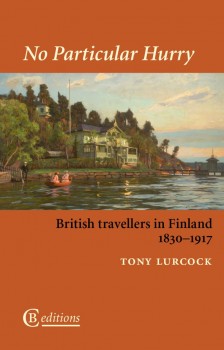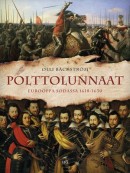Archive for July, 2013
No sex in Finland
31 July 2013 | Reviews
 Tony Lurcock
Tony Lurcock
No Particular Hurry. British Travellers in Finland 1830–1917
London: CB editions, 2013. 278 p.
ISBN 978-0-9567359-9-7
£10, paperback
For British travellers of the late 18th- and early 19th-century Finland was mainly a transit area between Stockholm and St Petersburg, or on the way to exotic Lapland. A century later, the country was already a tourist destination in itself, a newly emergent nation state, though still subordinate to Russia.
Tony Lurcock’s anthology of travel literature about Finland is a sequel to his collection ‘Not so Barren or Uncultivated’: British Travellers in Finland 1760–1830 (reviewed in Books from Finland in June 2013).
The practical conditions of tourism were changing. English-language tour guides were being published, and Britain now had direct steamship connections to Finland, where rail, road and inland waterway traffic had been established. In 1887 the Finnish Tourist Association was founded with the aim of making life easier for foreign tourists on selected travel routes. However, the British – like many other foreigners – marvelled at some of the country’s curious features: the excruciating rural journeys by horse and cart, the wretched inns and strange choice of food, the rye bread and milk-drinking, and of course the sauna. But to this there were also exceptions, in the form of new, surprisingly resplendent hotels, world-class dinners and the life of the modern city. More…
Olli Bäckström: Polttolunnaat. Eurooppa sodassa 1618–1630 [Trial by fire. Europe at war 1618–1630]
31 July 2013 | Mini reviews, Reviews
 Polttolunnaat. Eurooppa sodassa 1618–1630
Polttolunnaat. Eurooppa sodassa 1618–1630
[Trial by fire. Europe at war 1618–1630]
Helsinki: Suomalaisen Kirjallisuuden Seura (Finnish Literature Society), 2013. 558 p.
ISBN 978-952-222-394-4
€39, paperback
The Thirty Years War of 1618-48 which ravaged Europe, extending its influence to overseas colonies, has been considered a religious conflict in which several countries were involved for reasons of power politics. Olli Bäckström, who belongs to the younger generation of Finnish military historians, sees the first twelve years of the war as a separate entity that bears similarities to the so-called asymmetric conflicts of our own time, such as those in Africa, which are fought by mercenaries and non-state actors for whom war is an industry and way of life. The book begins by describing the situation in Europe in the early seventeenth century, and the background of the war. Contemporary researchers view it as a religious conflict that originally began in Bohemia and then turned into a political power struggle, but Bäckström sees also the early phase as remarkably nuanced. The Nordic states of Denmark and Sweden (of which Finland was a part) were also in pursuit of fame and power on the battlefields of Central Europe, although Sweden did not really take part in the war until the next phase. Bäckström vividly portrays the alliances formed by the various political actors in order to safeguard their interests, and the methods of warfare employed by the armed forces in the service of the different rulers.
Translated by David McDuff
Reindeer yoga?
15 July 2013 | This 'n' that

Human yoga wheel. Photo: Wikimedia
While Finnish politicians, just back at Parliament after their summer break, twiddle their thumbs in frustration as the nation faces darkening prospects for economic growth, Finland is being admired across the pond.
The Atlantic magazine took a long look at ‘the secrets of Finland’s success with schools, moms, kids – and everything’ (July 2013).
Olga Khazan reports: Finns enjoy long vacations, better school scores, unemployment insurance, paid parental leaves, cheap child care, education and medical services, and low infant mortality rates.
‘All of this adds up to the stress equivalent of living in what is essentially a vast, reindeer-fur-lined yoga studio.’
Whoa! Are we that happy in Finland? More…
